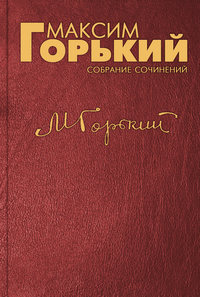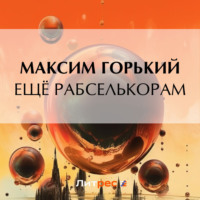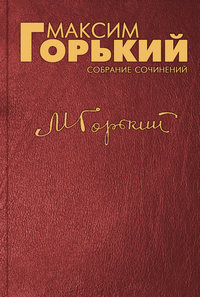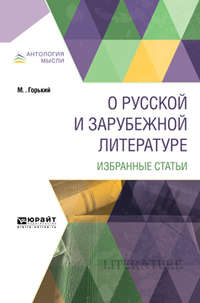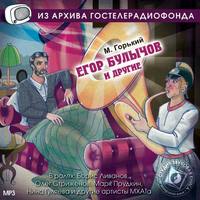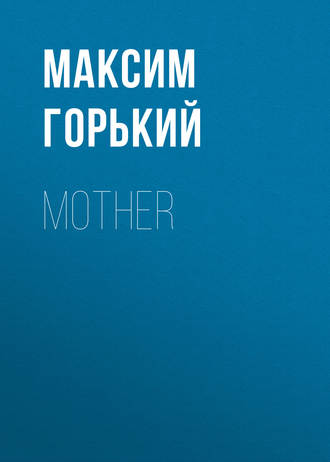 полная версия
полная версияMother
"I don't want my hands to be bound," said Rybin. "I'm not going to run away, and I'm not fighting. Why should my hands be bound?"
"What?" exclaimed the police commissioner, striding up to him.
"It's enough that you torture the people, you beasts!" continued Rybin in an elevated voice. "The red day will soon come for you, too. You'll be paid back for everything."
The police commissioner stood before him, his mustached upper lip twitching. Then he drew back a step, and with a whistling voice sang out in surprise:
"Um! you damned scoundrel! Wha-at? What do you mean by your words? People, you say? A-a – "
Suddenly he dealt Rybin a quick, sharp blow in the face.
"You won't kill the truth with your fist!" shouted Rybin, drawing on him. "And you have no right to beat me, you dog!"
"I won't dare, I suppose?" the police commissioner drawled.
Again he waved his hand, aiming at Rybin's head; Rybin ducked; the blow missed, and the police commissioner almost toppled over. Some one in the crowd gave a jeering snort, and the angry shout of Mikhaïl was heard:
"Don't you dare to beat me, I say, you infernal devil! I'm no weaker than you! Look out!"
The police commissioner looked around. The people shut down on him in a narrower circle, advancing sullenly.
"Nikita!" the police commissioner called out, looking around. "Nikita, hey!" A squat peasant in a short fur overcoat emerged from the crowd. He looked on the ground, with his large disheveled head drooping.
"Nikita," the police commissioner said deliberately, twirling his mustache, "give him a box on the ear – a good one!"
The peasant stepped forward, stopped in front of Rybin and raised his hand. Staring him straight in the face, Rybin stammered out heavily:
"Now look, people, how the beasts choke you with your own hands! Look! Look! Think! Why does he want to beat me – why? I ask."
The peasant raised his hand and lazily struck Mikhaïl's face.
"Ah, Nikita! don't forget God!" subdued shouts came from the crowd.
"Strike, I say!" shouted the police commissioner, pushing the peasant on the back of his neck.
The peasant stepped aside, and inclining his head, said sullenly:
"I won't do it again."
"What?" The face of the police commissioner quivered. He stamped his feet, and, cursing, suddenly flung himself upon Rybin. The blow whizzed through the air; Rybin staggered and waved his arms; with the second blow the police commissioner felled him to the ground, and, jumping around with a growl, he began to kick him on his breast, his side, and his head.
The crowd set up a hostile hum, rocked, and advanced upon the police commissioner. He noticed it and jumped away, snatching his saber from its scabbard.
"So that's what you're up to! You're rioting, are you?"
His voice trembled and broke; it had grown husky. And he lost his composure along with his voice. He drew his shoulders up about his head, bent over, and turning his blank, bright eyes on all sides, he fell back, carefully feeling the ground behind him with his feet. As he withdrew he shouted hoarsely in great excitement:
"All right; take him! I'm leaving! But now, do you know, you cursed dogs, that he is a political criminal; that he is going against our Czar; that he stirs up riots – do you know it? – against the Emperor, the Czar? And you protect him; you, too, are rebels. Aha – a – "
Without budging, without moving her eyes, the strength of reason gone from her, the mother stood as if in a heavy sleep, overwhelmed by fear and pity. The outraged, sullen, wrathful shouts of the people buzzed like bees in her head.
"If he has done something wrong, lead him to court."
"And don't beat him!"
"Forgive him, your Honor!"
"Now, really, what does it mean? Without any law whatever!"
"Why, is it possible? If they begin to beat everybody that way, what'll happen then?"
"The devils! Our torturers!"
The people fell into two groups – the one surrounding the police commissioner shouted and exhorted him; the other, less numerous, remained about the beaten man, humming and sullen. Several men lifted him from the ground. The policemen again wanted to bind his hands.
"Wait a little while, you devils!" the people shouted.
Rybin wiped the blood from his face and beard and looked about in silence. His gaze glided by the face of the mother. She started, stretched herself out to him, and instinctively waved her hand. He turned away; but in a few minutes his eyes again rested on her face. It seemed to her that he straightened himself and raised his head, that his blood-covered cheeks quivered.
"Did he recognize me? I wonder if he did?"
She nodded her head to him and started with a sorrowful, painful joy. But the next moment she saw that the blue-eyed peasant was standing near him and also looking at her. His gaze awakened her to the consciousness of the risk she was running.
"What am I doing? They'll take me, too."
The peasant said something to Rybin, who shook his head.
"Never mind!" he exclaimed, his voice tremulous, but clear and bold. "I'm not alone in the world. They'll not capture all the truth. In the place where I was the memory of me will remain. That's it! Even though they destroy the nest, aren't there more friends and comrades there?"
"He's saying this for me," the mother decided quickly.
"The people will build other nests for the truth; and a day will come when the eagles will fly from them into freedom. The people will emancipate themselves."
A woman brought a pail of water and, wailing and groaning, began to wash Rybin's face. Her thin, piteous voice mixed with Mikhaïl's words and hindered the mother from understanding them. A throng of peasants came up with the police commissioner in front of them. Some one shouted aloud:
"Come; I'm going to make an arrest! Who's next?"
Then the voice of the police commissioner was heard. It had changed – mortification now evident in its altered tone.
"I may strike you, but you mayn't strike me. Don't you dare, you dunce!"
"Is that so? And who are you, pray? A god?"
A confused but subdued clamor drowned Rybin's voice.
"Don't argue, uncle. You're up against the authorities."
"Don't be angry, your Honor. The man's out of his wits."
"Keep still, you funny fellow!"
"Here, they'll soon take you to the city!"
"There's more law there!"
The shouts of the crowd sounded pacificatory, entreating; they blended into a thick, indistinct babel, in which there was something hopeless and pitiful. The policemen led Rybin up the steps of the town hall and disappeared with him behind the doors. People began to depart in a hurry. The mother saw the blue-eyed peasant go across the square and look at her sidewise. Her legs trembled under her knees. A dismal feeling of impotence and loneliness gnawed at her heart sickeningly.
"I mustn't go away," she thought. "I mustn't!" and holding on to the rails firmly, she waited.
The police commissioner walked up the steps of the town hall and said in a rebuking voice, which had assumed its former blankness and soullessness:
"You're fools, you damned scoundrels! You don't understand a thing, and poke your noses into an affair like this – a government affair. Cattle! You ought to thank me, fall on your knees before me for my goodness! If I were to say so, you would all be put to hard labor."
About a score of peasants stood with bared heads and listened in silence. It began to grow dusk; the clouds lowered. The blue-eyed peasant walked up to the steps, and said with a sigh:
"That's the kind of business we have here!"
"Ye-es," the mother rejoined quietly.
He looked at her with an open gaze.
"What's your occupation?" he asked after a pause.
"I buy lace from the women, and linen, too."
The peasant slowly stroked his beard. Then looking up at the town hall he said gloomily and softly:
"You won't find anything of that kind here."
The mother looked down on him, and waited for a more suitable moment to depart for the tavern. The peasant's face was thoughtful and handsome and his eyes were sad. Broad-shouldered and tall, he was dressed in a patched-up coat, in a clean chintz shirt, and reddish homespun trousers. His feet were stockingless.
The mother for some reason drew a sigh of relief, and suddenly obeying an impulse from within, yielding to an instinct that got the better of her reason, she surprised herself by asking him:
"Can I stay in your house overnight?"
At the question everything in her muscles, her bones, tightened stiffly. She straightened herself, holding her breath, and fixed her eyes on the peasant. Pricking thoughts quickly flashed through her mind: "I'll ruin everybody – Nikolay Ivanovich, Sonyushka – I'll not see Pasha for a long time – they'll kill him – "
Looking on the ground, the peasant answered deliberately, folding his coat over his breast:
"Stay overnight? Yes, you can. Why not? Only my home is very poor!"
"Never mind; I'm not used to luxury," the mother answered uncalculatingly.
"You can stay with me overnight," the peasant repeated, measuring her with a searching glance.
It had already grown dark, and in the twilight his eyes shone cold, his face seemed very pale. The mother looked around, and as if dropping under distress, she said in an undertone:
"Then I'll go at once, and you'll take my valise."
"All right!" He shrugged his shoulders, again folded his coat and said softly:
"There goes the wagon!"
In a few moments, after the crowd had begun to disperse, Rybin appeared again on the steps of the town hall. His hands were bound; his head and face were wrapped up in a gray cloth, and he was pushed into a waiting wagon.
"Farewell, good people!" his voice rang out in the cold evening twilight. "Search for the truth. Guard it! Believe the man who will bring you the clean word; cherish him. Don't spare yourselves in the cause of truth!"
"Silence, you dog!" shouted the voice of the police commissioner. "Policeman, start the horses up, you fool!"
"What have you to be sorry for? What sort of life have you?"
The wagon started. Sitting in it with a policeman on either side, Rybin shouted dully:
"For the sake of what are you perishing – in hunger? Strive for freedom – it'll give you bread and – truth. Farewell, good people!"
The hasty rumble of the wheels, the tramp of the horses, the shout of the police officer, enveloped his speech and muffled it.
"It's done!" said the peasant, shaking his head. "You wait at the station a little while, and I'll come soon."
CHAPTER XI
The mother went to the room in the tavern, sat herself at the table in front of the samovar, took a piece of bread in her hand, looked at it, and slowly put it back on the plate. She was not hungry; the feeling in her breast rose again and flushed her with nausea. She grew faint and dizzy; the blood was sucked from her heart. Before her stood the face of the blue-eyed peasant. It was a face that expressed nothing and failed to arouse confidence. For some reason the mother did not want to tell herself in so many words that he would betray her. The suspicion lay deep in her breast – a dead weight, dull and motionless.
"He scented me!" she thought idly and faintly. "He noticed – he guessed." Further than this her thoughts would not go, and she sank into an oppressive despondency. The nausea, the spiritless stillness beyond the window that replaced the noise, disclosed something huge, but subdued, something frightening, which sharpened her feeling of solitude, her consciousness of powerlessness, and filled her heart with ashen gloom.
The young girl came in and stopped at the door.
"Shall I bring you an omelette?"
"No, thank you, I don't want it; the shouts frightened me."
The girl walked up to the table and began to speak excitedly in hasty, terror-stricken tones:
"How the police commissioner beat him! I stood near and could see. All his teeth were broken. He spit out and his teeth fell on the ground. The blood came thick – thick and dark. You couldn't see his eyes at all; they were swollen up. He's a tar man. The sergeant is in there in our place drunk, but he keeps on calling for whisky. They say there was a whole band of them, and that this bearded man was their elder, the hetman. Three were captured and one escaped. They seized a teacher, too; he was also with them. They don't believe in God, and they try to persuade others to rob all the churches. That's the kind of people they are; and our peasants, some of them pitied him – that fellow – and others say they should have settled him for good and all. We have such mean peasants here! Oh, my! oh, my!"
The mother, by giving the girl's disconnected, rapid talk her fixed attention, tried to stifle her uneasiness, to dissipate her dismal forebodings. As for the girl, she must have rejoiced in an auditor. Her words fairly choked her and she babbled on in lowered voice with greater and greater animation:
"Papa says it all comes from the poor crop. This is the second year we've had a bad harvest. The people are exhausted. That's the reason we have such peasants springing up now. What a shame! You ought to hear them shout and fight at the village assemblies. The other day when Vosynkov was sold out for arrears he dealt the starosta (bailiff) a cracking blow on the face. 'There are my arrears for you!' he says."
Heavy steps were heard at the door. The mother rose to her feet with difficulty. The blue-eyed peasant came in, and taking off his hat asked:
"Where is the baggage?"
He lifted the valise lightly, shook it, and said:
"Why, it's empty! Marya, show the guest the way to my house," and he walked off without looking around.
"Are you going to stay here overnight?" asked the girl.
"Yes. I'm after lace; I buy lace."
"They don't make lace here. They make lace in Tinkov and in Daryina, but not among us."
"I'm going there to-morrow; I'm tired."
On paying for the tea she made the girl very happy by handing her three kopecks. On the road the girl's feet splashed quickly in the mud.
"If you want to, I'll run over to Daryina, and I'll tell the women to bring their lace here. That'll save your going there. It's about eight miles."
"That's not necessary, my dear."
The cold air refreshed the mother as she stepped along beside the girl. A resolution slowly formulated itself in her mind – confused, but fraught with a promise. She wished to hasten its growth, and asked herself persistently: "How shall I behave? Suppose I come straight out with the truth?"
It was dark, damp, and cold. The windows of the peasants' huts shone dimly with a motionless reddish light; the cattle lowed drowsily in the stillness, and short halloos reverberated through the fields. The village was clothed in darkness and an oppressive melancholy.
"Here!" said the girl, "you've chosen a poor lodging for yourself. This peasant is very poor." She opened the door and shouted briskly into the hut: "Aunt Tatyana, a lodger has come!" She ran away, her "Good-by!" flying back from the darkness.
The mother stopped at the threshold and peered about with her palm above her eyes. The hut was very small, but its cleanness and neatness caught the eye at once. From behind the stove a young woman bowed silently and disappeared. On a table in a corner toward the front of the room burned a lamp. The master of the hut sat at the table, tapping his fingers on its edge. He fixed his glance on the mother's eyes.
"Come in!" he said, after a deliberate pause.
"Tatyana, go call Pyotr. Quick!"
The woman hastened away without looking at her guest. The mother seated herself on the bench opposite the peasant and looked around – her valise was not in sight. An oppressive stillness filled the hut, broken only by the scarcely audible sputtering of the lamplight. The face of the peasant, preoccupied and gloomy, wavered in vague outline before the eyes of the mother, and for some reason caused her dismal annoyance.
"Well, why doesn't he say something? Quick!"
"Where's my valise?" Her loud, stern question coming suddenly was a surprise to herself. The peasant shrugged his shoulders and thoughtfully gave the indefinite answer:
"It's safe." He lowered his voice and continued gloomily: "Just now, in front of the girl, I said on purpose that it was empty. No, it's not empty. It's very heavily loaded."
"Well, what of it?"
The peasant rose, approached her, bent over her, and whispered: "Do you know that man?"
The mother started, but answered firmly:
"I do."
Her laconic reply, as it were, kindled a light within her which rendered everything outside clear. She sighed in relief. Shifting her position on the bench, she settled herself more firmly on it, while the peasant laughed broadly.
"I guessed it – when you made the sign – and he, too. I asked him, whispering in his ear, whether he knows the woman standing on the steps."
"And what did he say?"
"He? He says 'there are a great many of us.' Yes – 'there are a great many of us,' he says."
The peasant looked into the eyes of his guest questioningly, and, smiling again, he continued:
"He's a man of great force, he is brave, he speaks straight out. They beat him, and he keeps on his own way."
The peasant's uncertain, weak voice, his unfinished, but clear face, his open eyes, inspired the mother with more and more confidence. Instead of alarm and despondency, a sharp, shooting pity for Rybin filled her bosom. Overwhelmed by her feelings, unable to restrain herself, she suddenly burst out in bitter malice:
"Robbers, bigots!" and she broke into sobs.
The peasant walked away from her, sullenly nodding his head.
"The authorities have hired a whole lot of assistants to do their dirty work for them. Yes, yes." He turned abruptly toward the mother again and said softly: "Here's what I guessed – that you have papers in the valise. Is that true?"
"Yes," answered the mother simply, wiping away her tears. "I was bringing them to him."
He lowered his brows, gathered his beard into his hand, and looking on the floor was silent for a time.
"The papers reached us, too; some books, also. We need them all. They are so true. I can do very little reading myself, but I have a friend – he can. My wife also reads to me." The peasant pondered for a moment. "Now, then, what are you going to do with them – with the valise?"
The mother looked at him.
"I'll leave it to you."
He was not surprised, did not protest, but only said curtly, "To us," and nodded his head in assent. He let go of his beard, but continued to comb it with his fingers as he sat down.
With inexorable, stubborn persistency the mother's memory held up before her eyes the scene of Rybin's torture. His image extinguished all thoughts in her mind. The pain and injury she felt for the man obscured every other sensation. Forgotten was the valise with the books and newspapers. She had feelings only for Rybin. Tears flowed constantly; her face was gloomy; but her voice did not tremble when she said to her host:
"They rob a man, they choke him, they trample him in the mud – the accursed! And when he says, 'What are you doing, you godless men?' they beat and torture him."
"Power," returned the peasant. "They have great power."
"From where do they get it?" exclaimed the mother, thoroughly aroused. "From us, from the people – they get everything from us."
"Ye-es," drawled the peasant. "It's a wheel." He bent his head toward the door, listening attentively. "They're coming," he said softly.
"Who?"
"Our people, I suppose."
His wife entered. A freckled peasant, stooping, strode into the hut after her. He threw his cap into a corner, and quickly went up to their host.
"Well?"
The host nodded in confirmation.
"Stepan," said the wife, standing at the oven, "maybe our guest wants to eat something."
"No, thank you, my dear."
The freckled peasant moved toward the mother and said quietly, in a broken voice:
"Now, then, permit me to introduce myself to you. My name is Pyotr Yegorov Ryabinin, nicknamed Shilo – the Awl. I understand something about your affairs. I can read and write. I'm no fool, so to speak." He grasped the hand the mother extended to him, and wringing it, turned to the master of the house.
"There, Stepan, see, Varvara Nikolayevna is a good lady, true. But in regard to all this, she says it is nonsense, nothing but dreams. Boys and different students, she says, muddle the people's mind with absurdities. However, you saw just now a sober, steady man, as he ought to be, a peasant, arrested. Now, here is she, an elderly woman, and as to be seen, not of blue blood. Don't be offended – what's your station in life?"
He spoke quickly and distinctly, without taking breath. His little beard shook nervously, and his dark eyes, which he screwed up, rapidly scanned the mother's face and figure. Ragged, crumpled, his hair disheveled, he seemed just to have come from a fight, in which he had vanquished his opponent, and still to be flushed with the joy of victory. He pleased the mother with his sprightliness and his simple talk, which at once went straight to the point. She gave him a kind look as she answered his question. He once more shook her hand vigorously, and laughed softly.
"You see, Stepan, it's a clean business, an excellent business. I told you so. This is the way it is: the people, so to speak, are beginning to take things into their own hands. And as to the lady – she won't tell you the truth; it's harmful to her. I respect her, I must say; she's a good person, and wishes us well – well, a little bit, and provided it won't harm her any. But the people want to go straight, and they fear no loss and no harm – you see? – all life is harmful to them; they have no place to turn to; they have nothing all around except 'Stop!' which is shouted at them from all sides."
"I see," said Stepan, nodding and immediately adding: "She's uneasy about her baggage."
Pyotr gave the mother a shrewd wink, and again reassured her:
"Don't be uneasy; it's all right. Everything will be all right, mother. Your valise is in my house. Just now when he told me about you – that you also participate in this work and that you know that man – I said to him: 'Take care, Stepan! In such a serious business you must keep your mouth shut.' Well, and you, too, mother, seem to have scented us when we stood near you. The faces of honest people can be told at once. Not many of them walk the streets, to speak frankly. Your valise is in my house." He sat down alongside of her and looked entreatingly into her eyes. "If you wish to empty it we'll help you, with pleasure. We need books."
"She wants to give us everything," remarked Stepan.
"First rate, mother! We'll find a place for all of it." He jumped to his feet, burst into a laugh, and quickly pacing up and down the room said contentedly: "The matter is perfectly simple: in one place it snaps, and in another it is tied up. Very well! And the newspaper, mother, is a good one, and does its work – it peels the people's eyes open; it's unpleasant to the masters. I do carpentry work for a lady about five miles from here – a good woman, I must admit. She gives me various books, sometimes very simple books. I read them over – I might as well fall asleep. In general we're thankful to her. But I showed her one book and a number of a newspaper; she was somewhat offended. 'Drop it, Pyotr!' she said. 'Yes, this,' she says, 'is the work of senseless youngsters; from such a business your troubles can only increase; prison and Siberia for this,' she says."
He grew abruptly silent, reflected for a moment, and asked: "Tell me, mother, this man – is he a relative of yours?"
"A stranger."
Pyotr threw his head back and laughed noiselessly, very well satisfied with something. To the mother, however, it seemed the very next instant that, in reference to Rybin, the word "stranger" was not in place; it jarred upon her.
"I'm not a relative of his; but I've known him for a long time, and I look up to him as to an elder brother."
She was pained and displeased not to find the word she wanted, and she could not suppress a quiet groan. A sad stillness pervaded the hut. Pyotr leaned his head upon one shoulder; his little beard, narrow and sharp, stuck out comically on one side, and gave his shadow swinging on the wall the appearance of a man sticking out his tongue teasingly. Stepan sat with his elbows on the table, and beat a tattoo on the boards. His wife stood at the oven without stirring; the mother felt her look riveted upon herself and often glanced at the woman's face – oval, swarthy, with a straight nose, and a chin cut off short; her dark and thick eyebrows joined sternly, her eyelids drooped, and from under them her greenish eyes shone sharply and intently.




